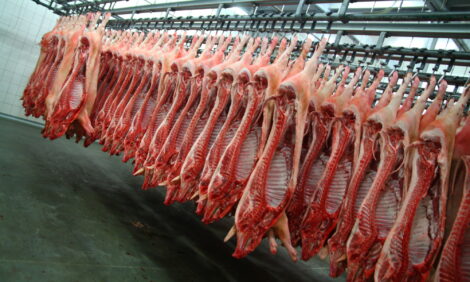



Chinese Industry Needs to Modernise and Industrialise
Pig meat production in China, the world's largest meat producer, is growing and in particular the country is seeing a growth in branded products, writes ThePigSite Senior Editor, Chris Harris.
Deng Fuijiang, the standing vice president and secretary general of the China Meat Association told the World Pork Conference in Qingdao that China's total meat production reached 72.782 million tonnes last year – a rise of six per cent on the previous year.
China now has a 29 per cent share of the global meat trade and it has also seen consumption rise to 54.8 kg per person.
Of the total production, pork took the largest share with 40.7 million tonnes more than 60 per cent of total production.
Over the last year, China has also seen its total trade in meat and meat products rise dramatically with a 31.2 per cent increase in pork trade and 23.4 per cent increase in the beef trade.
"China's meat industry has kept on increasing despite the global economic crisis," Mr Deng told the conference.
"Last year, the country had a total of 3,096 meat plants. This was a rise of 249 on the previous year.
"The investment is mainly going to the major livestock areas," he said.
Mr Deng added that the country increased production of branded products by 0.5 per cent rise last year to take a 15 per cent share of the meat market.
"Famous branded names demonstrate the strength of the company," Mr Deng said.
The great proportion of the meat industry is held by the large companies with the top 90 companies holding a 75 per cent market share of production in volume and 72 per cent in value. In all, the Chinese meat processing companies had a turnover last year of RMB 42.423 billion (yuan) and they saw their profits rise by 15.9 per cent to RMB 15.37 billion.
While the industry is growing, it is also in the process of strategically restructuring.
Mr Deng said that while the production of meat products is going to be the way forward for the industry, it is also facing severe problems because it is finding difficulties in adapting to the changing needs of the consumer and global demands, and it is experiencing a shortage in supply of raw materials.
He said that the government had supported supply, but now prices have dropped below the cost of production.
He said there was not only a shortage of raw materials, but also a severe overcapacity in the industry.
"Many companies have found problems of margins being very slim and problems in buying in raw materials."
While many companies in the past slaughtered and processed all their own products, now some companies are slaughtering for others, and processors are being forced to buy in meat.
"The increase in output has been slow and the improvement in quality is below what was needed by the market," Mr Deng said.
In all, he said that 80 per cent of the processors and slaughterers are under-equipped technologically. This has put the meat industry at a critical point in the process of upgrading.
"It might take consumer demand as a driver to stimulate growth," Mr Deng said.
"There are many concerns about meat quality, supply and safety, and Chinese companies also lack the international competitiveness.
"We need to ensure a stable supply of meat products and improve quality and safety, and enhance the sustainability of the Chinese meat industry."
To achieve this, Mr Deng said China has to change its scattered rearing to production on an industrial scale. It also needs to change its system of small workshop slaughterhouses to modern industrial-sized processing plants and the country also needs to grow and develop its transport and logistics systems.
"We must reform the structure and direct resources to the large-scale companies and phase out the backward production facilities."
He added that there was a need for a varied product mix and a change from a simple production line to one that provided a variety.

The need for change in the industry was reiterated by Wan Long, the head of one of the country's leading meat production and processing companies, the Shuanghui Industry Group (Shineway).
He said that urban incomes in China are growing and higher living standards have pushed meat production ahead.
"There is a strong demand for meat," he said.
"Although the meat industry has advanced, there are still a lot of workshops and small enterprises that may be only slaughtering a dozen pigs a day.
"Although 90 companies hold 75 per cent of the assets in the industry, the country still has a large number of small-scale businesses that are behind the times.
"In these companies, the quality of the product cannot be guaranteed."
He warned that the industry experiences local protectionism and in some areas, the companies do not follow good practice and also restrict access to products from advanced operations.
"We have to implement the new food safety law and give priority to the safety of our food," said Mr Wan.
"Processing, distribution and product have to be industrialised to increase farm incomes and ensure quality at source and food safety.
"We have to speed up modernisation and we have to upgrade. To achieve this we must introduce modern technology from other countries.
"We have to adopt standard assessment systems such as HACCP and ISO and we have to remove local protectionism.
"We have to improve market access and we need an industry that carries a high prestige."
September 2009








